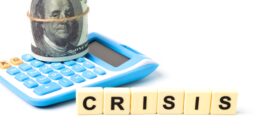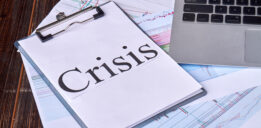The Trade War Has Begun, and Its Effect Will Be Nothing Less Than a Global Recession
The risk of a global recession has increased significantly in the past few weeks—maybe even more in the past few days.
The risk is not from an isolated event. Rather, we can expect a global recession beginning in the last quarter of 2018, and even more so in 2019.
It does not take a financial wizard to realize that a recession has become inevitable; economic growth has come under threat.
Whatever antibodies it still has to resist will not cope. The series of global developments that President Donald Trump has launched are killing world trade.
The Cost of Money Is Going Back to Normal
There is a stabilization of monetary conditions. That sounds better than its effects. What this means is that interest rates are moving higher.
The U.S. Federal Reserve has already begun the process, gradually lifting interest rates as expected.
Nevertheless, Fed Chair Jerome Powell has all but confirmed that there will be four rate hikes in 2018, instead of the expected three. Simply put, nobody knows if the U.S. economy can sustain such a hit.
Meanwhile, other parameters for world trade—once believed to be solid—are shifting.
Artificial Optimism
Central governments have used interest rates primarily to slow inflation. However, it was the kind of inflation that results from rising wages and employment.
The media and others have exaggerated both phenomena, fueling a narrative of optimism after the deepest economic recession since the 1930s.
The U.S. economy, in particular, is said to be hiring record numbers of people. Not since 1969 has it been so close to the magic level of full employment.
If everyone is working more without being able to spend more—and barely affording to pay off the debts they accumulated during the 2007–2017 decade (one of the hardest for overall welfare)—it shows that salaries are failing to rise fast enough.
Most People Are Earning Less
Meanwhile, wages, despite reports of increases, have stagnated for so long after dropping in the wake of the 2008 financial crisis that whatever surge has occurred is likely to be inadequate to address the glaring income inequality gap.
This is hardly just an American issue. Although income inequality might be one of the biggest dangers of social implosion in the United States, most of what was once called the industrialized world—the G7 or G20 countries, for example—has fared little better on that front. (Source: “Global employment is rising. Wages not so much,” CNN, July 4, 2018.)
The gap between higher- and lower-wage earners has widened also because only a few companies (the usual suspects in Silicon Valley among them) are making any real gains.
Many companies are shy about making big investments, given the heightened geopolitical tensions and related risks. This is especially because President Trump appears to have launched a global trade war, regardless of the consequences.
The higher inflation excuse that Treasuries have pulled out of their hats to please the banks will only raise the risk of recession.
Less Income, Despite Higher Employment, Creates Pessimism
If central banks managed the worst effects of the financial crisis by easing interest rates to stimulate spending, adopting the opposite course should have the opposite effect.
It’s a question of timing. Nobody can be sure what the accommodating interest regime has done. Has it contributed to sustaining growth or saving a sinking ship?
Assuming that the global economy in 2008 was a sinking ship, which economist today is willing to assure the world that the holes in the hull have been fixed and that the economy is watertight?
Most businesses, governments, and individuals would be correct to observe whatever economic growth that still lingers in a less optimistic light.
Restoring the higher-interest-rate regime while the effects of the financial crisis may be taking a nap will mainly produce two things:
- A reduction in disposable incomes, even for consumers with jobs.
- Mortgages and other loans becoming more costly and discouraging to take on. Therefore, fewer homes, vehicles, appliances, etc. will be sold.
How can inflation realistically be increasing—other than the fact that energy costs certainly are increasing with little relief in sight—if most people are working more yet bringing home less?
30-Year-Old Order Comes to a Close With Nothing Better to Replace It
The combination of risks, escalating tariffs, and reduced trade opportunities—in a world where the free trade mantra has operated unabated for the past 30 years—has produced nothing short of a collective psychological reluctance to growth.
The United States has imposed new tariffs against its trading partners, many of which are even key military and political allies. Trade tensions cannot do anything but worsen as Europe prepares to retaliate.
Those wondering how that could happen need not look any further than their own computers.
The big information technology, social media, and Internet giants—including Apple Inc. (NASDAQ:AAPL), Facebook, Inc. (NASDAQ:FB), Alphabet Inc (NASDAQ:GOOG), and Microsoft Corporation (NASDAQ:MSFT)—have been making big profits in Europe and the rest of the world without paying their fair share of taxes.
Accountants at these firms have been sharpening their pencils to prepare for the onslaught of regulations and tighter profit margins that may be coming soon.
Most businesses and individuals have lost their confidence. Other than a few privileged and highly cocooned companies, most aren’t investing.
The trade tensions represent the most important risk of a recession in the United States, Europe, and China—in other words, the whole world.
The Trade War
There’s no other way to describe what’s coming.
The trade war will clash with the probability of the U.S. government incurring more debt. A lopsided fiscal reform rewarded those who didn’t need more money, leaving those who did with meager gains, if any.
The reforms were certainly not enough to make a dent in overall individual indebtedness in the United States.
The big global financial agencies, from the World Trade Organization (WTO) to the International Monetary Fund (IMF) had expected the world economy to continue improving—at least according to some numbers. Rather, the rules of the game have changed, and they have reversed any hint of a sustained growth trend.
The global context is telling the world that conditions for investment have become less than ideal and that a recession is pending.






